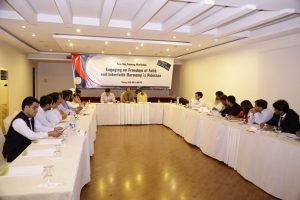First training conducted on engaging on interfaith harmony in Pakistan
On 11th and 12th April 2018, Pak Institute for Peace Studies (PIPS) conducted a workshop on “Engaging on freedom of faith and inter-faith harmony in Pakistan”, in Islamabad. It was attended by around 20 experts, faith leaders, and development professionals who have worked in the domain of interfaith harmony, from Islamabad, Khyber Pakhtunkhwa, FATA, and Gilgit-Baltistan.
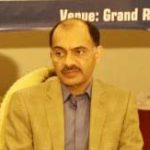 The workshop started off with a formal introduction by PIPS senior researcher Safdar Sial. He underlined that the purpose of the discussion was to know how to undertake different activities aimed at enhancing interfaith harmony. He suggested the participants to take active part in the discussions, but with logic. He also asked them to compile recommendations on how to improve policies and programs on the subject – freedom of faith and interfaith harmony – within the realities of Pakistan.
The workshop started off with a formal introduction by PIPS senior researcher Safdar Sial. He underlined that the purpose of the discussion was to know how to undertake different activities aimed at enhancing interfaith harmony. He suggested the participants to take active part in the discussions, but with logic. He also asked them to compile recommendations on how to improve policies and programs on the subject – freedom of faith and interfaith harmony – within the realities of Pakistan.
PIPS Senior Project Manager Muhammad Ismail Khan then shared findings of the interim report on undertaking initiatives related to freedom of faith and interfaith harmony in Pakistan. The report was compiled from interviews and focus-group discussion in the four provincial capitals with experts, faith leaders, development experts, academics, and journalists.
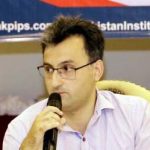 Ismail noted that freedom of faith and interfaith harmony is often considered as protecting the rights of minorities in Pakistan. Given that faith-based extremism has pervaded across all segments of the society, there is a need for treating the subject of interfaith harmony, as a cross-cutting theme, much like gender is taken by many rights-based organizations. At the same time, organizations should know what it means by conflict-sensitive approach, something that does not exacerbate the existing tensions. He said the role of faith leaders, educationists, organizations, and some public departments is pivotal in this regard, and engagements be sought to this end.
Ismail noted that freedom of faith and interfaith harmony is often considered as protecting the rights of minorities in Pakistan. Given that faith-based extremism has pervaded across all segments of the society, there is a need for treating the subject of interfaith harmony, as a cross-cutting theme, much like gender is taken by many rights-based organizations. At the same time, organizations should know what it means by conflict-sensitive approach, something that does not exacerbate the existing tensions. He said the role of faith leaders, educationists, organizations, and some public departments is pivotal in this regard, and engagements be sought to this end.
Among some issues faced by different faith groups, one of them pertains to inconsistency in their documentation. All non-Muslim groups contest their total count made on 1998 census, while the religious-wise numbers of the 2018 census are yet to be publicized. In some cases, those on the lower-rung even lack identity documents, thereby excluding them from socio-political processes and increasing their vulnerabilities.
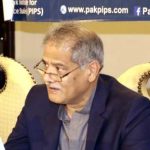 Taking the argument forward, Zafarullah Khan, an expert on constitution affairs, argued it is not that only a non-Muslim is discriminated; many Muslims too are on the periphery, and, like non-Muslims, are vulnerable to exploitation too. He argued that in some cases, the Constitution grants more rights to non-Muslims than to Muslims. On ground, to be sure, the feelings are otherwise.
Taking the argument forward, Zafarullah Khan, an expert on constitution affairs, argued it is not that only a non-Muslim is discriminated; many Muslims too are on the periphery, and, like non-Muslims, are vulnerable to exploitation too. He argued that in some cases, the Constitution grants more rights to non-Muslims than to Muslims. On ground, to be sure, the feelings are otherwise.
Thus, rather than compartmentalizing the issue, presenting it as the problem of one or other community, Zafarullah Khan asked to explore how common Pakistanis have been denied the rights accorded to them as citizens of the land. This, he said, has spawned different types of citizens, ranging from those who live in FATA to those who in Islamabad.
Strikingly, while quoting from the constitutional history of Pakistan, Zafarullah underlined that “democracy in Pakistan has promoted inclusion of non-Muslims, whereas dictatorial eras saw exclusion.” There was not a single non-Muslim legislator in the legislature of Ayub’s, while Zia’s policies negatively impacted non-Muslims. This reality calls upon strengthening democratic norms and institutions in the country.
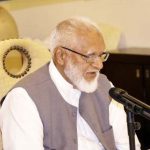 Renowned Islamic scholar Dr Khalid Masud also underscored that according to Islamic jurisprudence, non-Muslims Pakistanis are equal citizens of the land and cannot be regarded as “zimmis.”
Renowned Islamic scholar Dr Khalid Masud also underscored that according to Islamic jurisprudence, non-Muslims Pakistanis are equal citizens of the land and cannot be regarded as “zimmis.”
Peace activist Romana Bashir brought to forum the range of issues non-Muslims have to deal with on ground. She noted that non-Muslims are discriminated in educational institution on an everyday basis; this discrimination not only comes from the books but also from the teachers who take a judgmental view of students.
to deal with on ground. She noted that non-Muslims are discriminated in educational institution on an everyday basis; this discrimination not only comes from the books but also from the teachers who take a judgmental view of students.
She lamented how religion has been used as a card to oppress the weaker segment of society, and call for annulling this attitude.
Earlier, quoting from the report, a range of suggestions were discussed, one of which was about economic mainstreaming of non-Muslims. It was suggested that the 5% quota marked for non-Muslims should be filled properly. Civil society should get data on that, and train others on how to get that data, using the Right to Information Act (RTI).
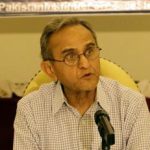 Educationist AH Nayyar said that hate speech has created an insecure environment in campus. It has distorted the harmony in educational sector too. Hate speakers are the major player in creating disturbances; this should stop, he said. He linked interfaith harmony to educational reforms in the country.
Educationist AH Nayyar said that hate speech has created an insecure environment in campus. It has distorted the harmony in educational sector too. Hate speakers are the major player in creating disturbances; this should stop, he said. He linked interfaith harmony to educational reforms in the country.
The next day, participants and experts discussed which players are pivotal to fostering harmony, and how.
Senior journalist Sabookh Syed agreed that media have been reporting mostly on political and security happenings, at the cost of issues pertaining to interfaith harmony. But he reminded that media itself is influenced by viewers’ choices. While we tend to talk a lot, blaming media for everything, we rarely take action for our betterment, he said, summarizing, “Vote and remote are in your hands.”Participants were told about the centrality of society in creating a peaceful environment. Unless people embrace each other, expecting state authorities to do is illogical.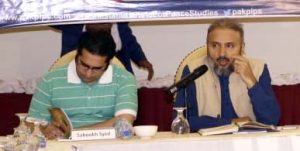
Faith leaders have a central role too. Discussing that role, religious scholar Amanat Rasool discussed that faith leaders can bring about reforms in the society through their position in the community, by delivering sermons on interfaith harmony.
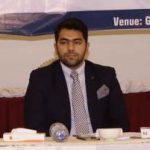 Youth activist Zeeshan Zafar stressed that the country’s youth population seems to be going in the wrong direction, largely because of the environment they are brought up in. He stressed upon prioritizing reforms in educational curriculum. It was also suggested that religious tourism in the country can also help in melting people’s opinion about each other.
Youth activist Zeeshan Zafar stressed that the country’s youth population seems to be going in the wrong direction, largely because of the environment they are brought up in. He stressed upon prioritizing reforms in educational curriculum. It was also suggested that religious tourism in the country can also help in melting people’s opinion about each other.
Development expert Rashad Bokhari commended the work of people and organizations striving for a tolerant and peaceful free society but lamented that such change agents are wrongly linked to external forces. This, he said, is the biggest hindrance in attempting to undertake any such activity, calling for discarding this attitude.
In the end, participants also shared their recommendations on promoting interfaith harmony. They said both state and civil society have their roles to play. The state, they said, should identify issues affecting interfaith harmony, provide for quota to non-Muslims in education, arrange exposure visits; shape an inclusive curriculum among others. Civil society organizations can raise awareness of people, arrange dialogue, partner with district bodies, and engage youth.
Gallery:


